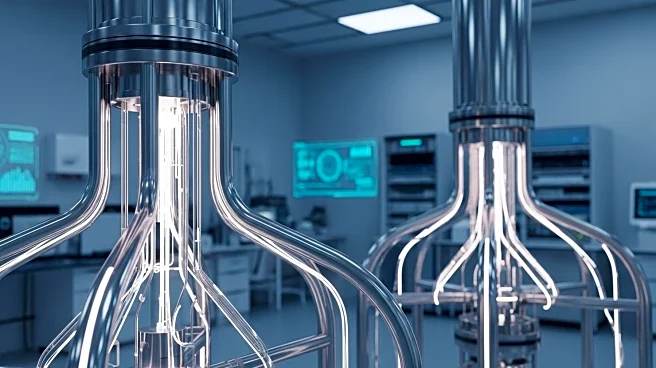What's Happening?
Reac-Discovery is an innovative platform that integrates artificial intelligence to design, fabricate, and optimize catalytic reactors. The platform consists of three interconnected modules: Reac-Gen, Reac-Fab, and Reac-Eval. Reac-Gen digitally constructs reactor geometries using mathematical equations, while Reac-Fab validates and fabricates these designs using high-resolution 3D printing. Reac-Eval, a self-driving laboratory, evaluates reactor performance using real-time monitoring and machine learning models. This approach allows for rapid optimization of complex chemical transformations, enhancing reactor performance and reducing material usage.
Why It's Important?
The Reac-Discovery platform represents a significant advancement in chemical engineering, offering a data-driven approach to reactor design and optimization. By integrating machine learning and real-time monitoring, the platform reduces experimental redundancies and accelerates research timelines. This methodology enhances catalytic performance while minimizing resource consumption and human intervention. The platform's ability to optimize reactor geometries and operating conditions could lead to more efficient industrial processes, benefiting sectors such as pharmaceuticals and fine chemicals.
What's Next?
The Reac-Discovery platform is poised to expand its capabilities by incorporating additional surface equations and exploring a broader diversity of periodic structures. Future developments may include adapting the platform for other materials and printing technologies, further enhancing its versatility. The platform's iterative approach will continue to refine reactor designs and process conditions, potentially leading to breakthroughs in catalytic performance and efficiency.
Beyond the Headlines
The Reac-Discovery platform not only optimizes reactor performance but also represents a shift towards more sustainable and efficient chemical processes. By reducing the need for extensive preliminary testing and human intervention, the platform supports a more resource-efficient approach to chemical engineering. This could have long-term implications for the industry, promoting innovation and sustainability in reactor design.










